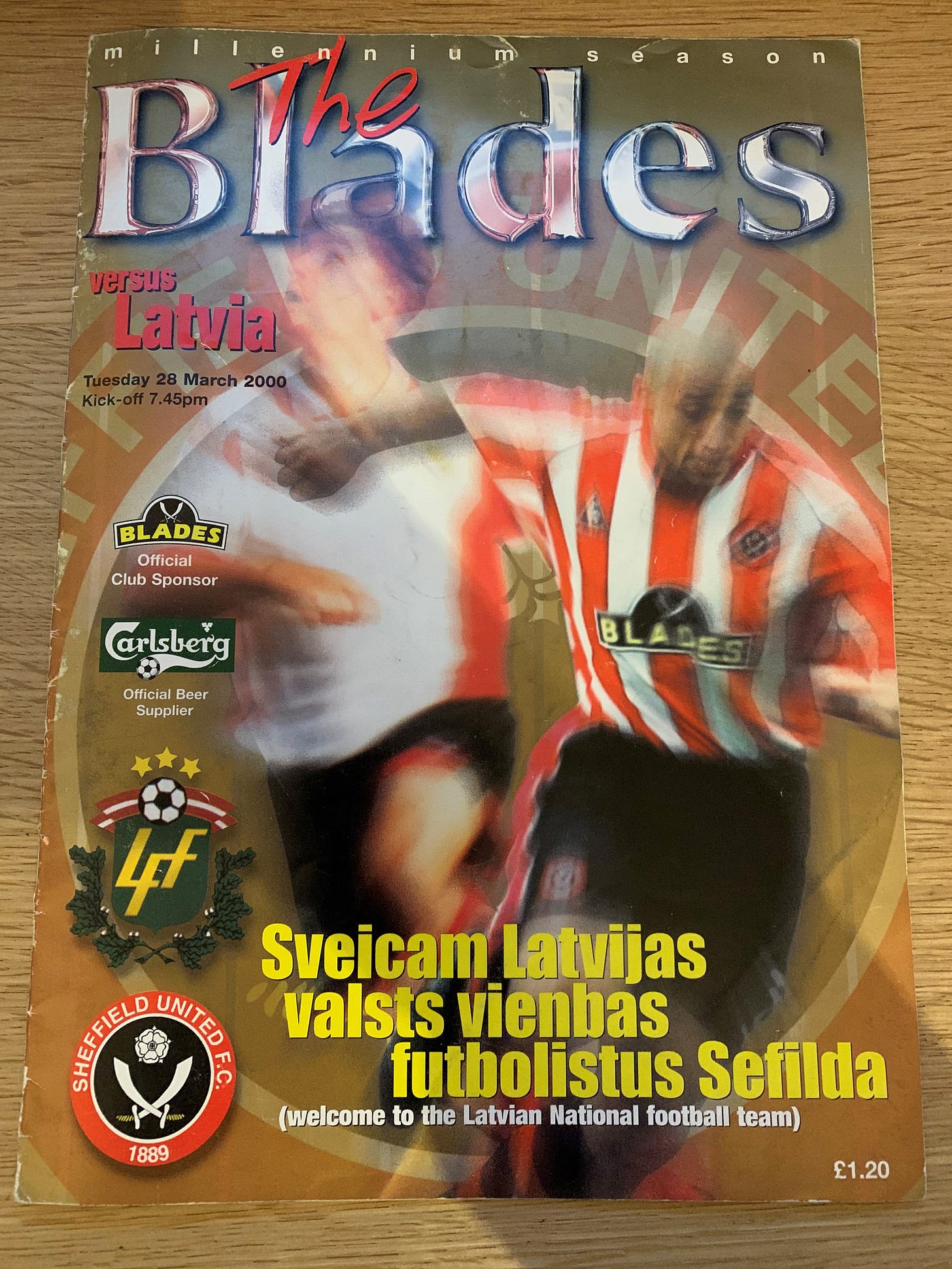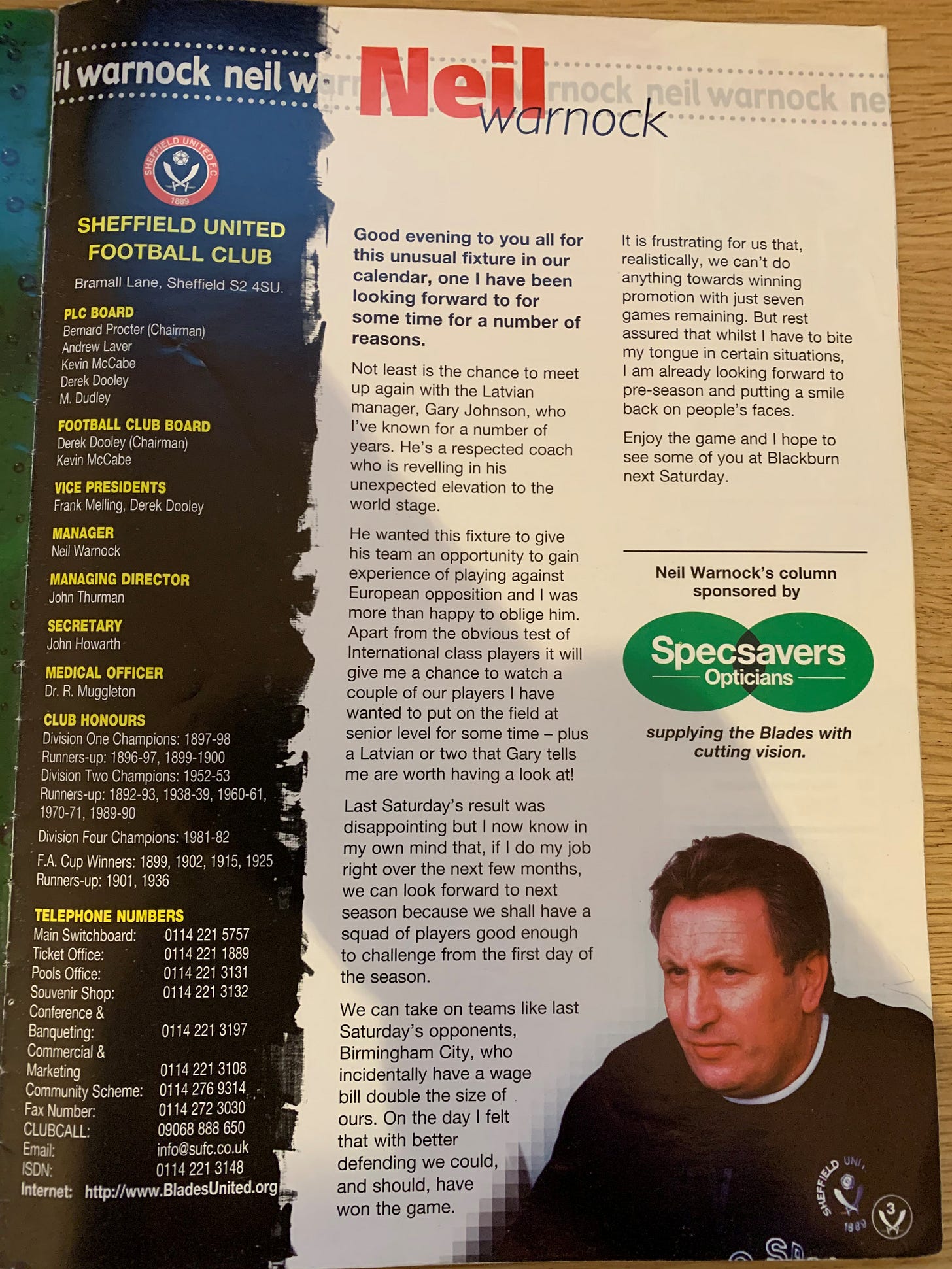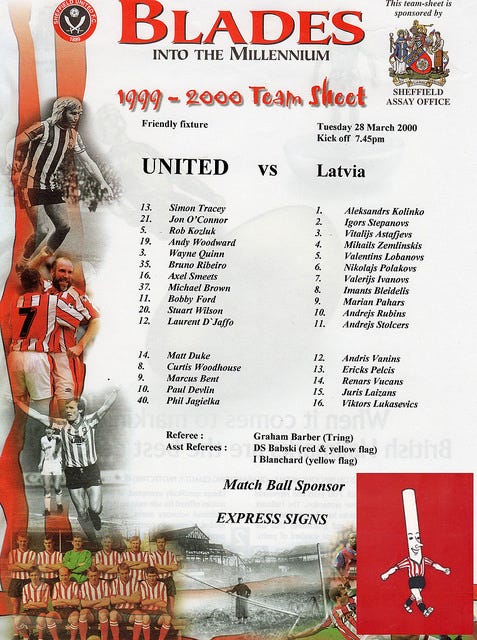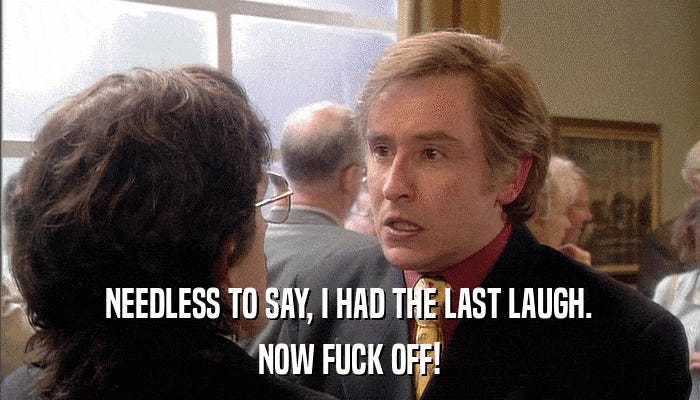Why did Sheffield United play a friendly with Latvia in 2000?
Ben Meakin on an unlikely friendly, a bizarrely strong starting XI and the managers who became best of enemies.
Ben Meakin (BladesPod)
As England got ready to take on Latvia this week in their World Cup qualifying campaign, it came to my attention that this was the first-ever meeting between the two nations. Of course, my immediate reaction was that prior to 8pm on Monday 24th March 2025, Sheffield United had played more games of football against Latvia than England had.
Almost twenty-five years ago to the day, the Blades hosted Latvia in a friendly at Bramall Lane; I don’t know why. I went; I don’t know why. Despite the sheer rarity of a club side taking on an international team, I’d completely memory-holed the entire thing – until this week.
This game took place in March 2000, meaning that the game’s digital footprint is minuscule outside of a few Getty Image photos and a forum thread from nine years ago asking if anyone remembered the game. Few, apparently, did – or at least, felt compelled to talk about it.
However, this is the internet, and if you look hard enough you can find pretty much anything. Three cheers, then, for forum user S64 Blade, who uploaded a bunch of photos of the matchday programme that has helped shine a light on this bizarre fixture for those who actually care about such things in 2025: namely, me.
Setting the scene: the 1999/2000 season was not a glorious one for the Blades, who finished 16th in the second tier. For a little while 16th looked like dizzy heights, as Adrian Heath’s tenure unravelled in late autumn and he was booted out following an infamous home defeat by Port Vale. Neil Warnock took the reins two games later; United lost just two of their next 16 and were able to breathe easy by the time we reached mid-March.
It was at this point that the Latvia fixture was scheduled, something that Warnock acknowledged was an “unusual fixture” in his programme notes, but nonetheless, one he “had been looking forward to for some time”, suggesting it had been organised well in advance.
At the time, Latvia had only returned to international football relatively recently after regaining independence from the Soviet Union in 1991. In 1992, they played their first international match since 1940 and were steadily improving internationally and domestically. In 1999, they replaced Georgian manager Revaz Dzodzuashvili with [checks notes] Gary Johnson, and I’m 99% sure that’s why Sheffield United played a friendly with Latvia one year later.
Johnson, who would later manage Yeovil Town as they knocked an insipid United out of the 2012/13 League One playoffs, was, in Warnock’s words, looking for “an opportunity to gain experience of playing against European opposition”. Warnock, and by extension United, were clearly happy enough to do Johnson a solid, although Warnock did also half-joke that Johnson had recommended a few of his Latvian team as possible signings.
And so, the Blades lined up to take on Latvia in front of approximately 4,000 fans at Bramall Lane:
I remember precious little of the game itself, apart from that it finished 1-0 to Latvia with Marian Pahars – scorer of 42 Premier League goals for Southampton – getting the winner. For United, this game also saw an early appearance for 17-year-old Phil Jagielka, who made his competitive league debut a few months later.
This was a surprisingly strong Blades XI, given they’d played three days prior and had another league fixture three days later. Tracey, Kozluk, Quinn, Brown, Ford and D’Jaffo had all started the last game, with Andy Woodward and Stuart Wilson (no, me neither) coming off the bench. But not even a powerhouse starting eleven with the likes of Axel Smeets in it could stop Latvia from nicking a win.
Writing those words I do now recall feeling slightly disappointed at the loss. I was looking forward to being able to say “Yeah, well, Wednesday might be in the Premiership, but United just beat a whole country”. But sadly, it wasn’t to be, and Wednesday have continued to lord it over the red half of the city to this day.
Armed with those fleeting memories and that teamsheet, back to the internet I went, discovering plenty more which I am delighted to share with you now in the hope of – at least – making some of this information easier to google in the future:
Latvian goalkeeper Alex Kolinko was later signed by Crystal Palace (playing against United in the League Cup Quarter Final in United’s “Triple Assault” season of 2002/03), and would be frozen out after claiming to have been punched in the face by manager Trevor Francis for laughing when Palace conceded a goal.
Striker Andrejs Stolcers had a wonderfully nomadic playing career, jumping from Latvia to Ukraine to West London to the West Country to Azerbaijan and eventually landing in Somerset with Bath City. Wikipedia says he now teaches at a school in Surrey; I’m inclined to believe it.
Keeper Matt Duke is of course still on United’s books in 2025, having re-joined as goalkeeper coach in 2023. Rumours abounded that Duke was the man responsible for recommending we sign Ivo Grbic last season; for Duke’s sake I’m inclined not to believe it.
Defender Igor Stepanovs became a Premier League winner with Arsenal in 2002, as well as winning back-to-back FA Cups. Ray Parlour tells a rather uncharitable (but admittedly quite funny) story about Stepanovs joining the Gunners after glowing feedback from him and Dennis Bergkamp during the Latvian’s trial period.
“I’ve played against some great centre-halves,” Bergkamp is alleged to have loudly declared during one session, “but I wouldn’t want to play against this guy.” Said reviews were delivered with the sole intention of winding up fellow defender Martin Keown, which worked – and may have been overheard by Arsene Wenger. Parlour was shocked a few weeks later to find out Stepanovs had been given a four-year deal.
Jon O’Connor was signed from Everton as part of a part-exchange deal for Don Hutchison, and was a highly-rated English youngster who had already played at Under 21 level. Sadly, injury ruined his career and he retired barely a year after this game due to glandular fever-related problems.
Axel Smeets was sent off on his Blades debut at Portsmouth in 1999, and quickly became a byword for terrible foreign signings. He ended his career with Norwegian side HamKam, ending up in the Norwegian Athletes Association Team of the Year in 2004.
If Neil Warnock and Gary Johnson were mates in 2000, it didn’t last. In 2009 Warnock was incensed when the referee failed to award his Crystal Palace side a goal in a game against Bristol City, managed then by Johnson, after a Freddie Sears shot hit the stanchion and bounced back out (that clip, incidentally, contains some absolutely classic world’s-against-us rhetoric from Warnock).
Warnock claimed that he demanded Johnson allow his side to score a goal to right this wrong, but Johnson declined. Writing about the incident in The Independent four years later, Warnock said:
I told Gary, “You’ll regret it, what comes around, goes around,” and told the press I was disappointed but it wouldn’t surprise me if everything went wrong for Johnson afterwards. I was right, he ended up getting the sack.”
The unseriousness of this fixture was rather underlined by how United ended that season: they didn’t win again after the Latvia game. We got tanked 5-0 at Blackburn three days later, drew 0-0 at home to Grimsby Town and then hammered 4-0 at Fulham. Two draws and a defeat rounded things off.
Whatever Warnock hoped to learn from his side by playing a game with Latvia, it obviously didn’t amount to much. We started the next season incredibly slowly, going winless in our first six (making it 12 games without victory post-Latvia) and eventually stumbling to a 13th-place finish where the “highlight” was the Battle of Bramall Lane debacle against West Brom.
Yet from those ashes of mediocrity rose one of the most exciting sides I’ve had the pleasure of seeing, with a now-fully-formed Phil Jagielka at its core. Perhaps Neil knew what he was doing after all. Sveicam Latvijas valsts vienbas futbolistus Sefilda indeed.







Thanks, Ben
This was a season before I started supporting The Blades, so very interesting seeing Neil Warnock's arrival . . . and thanks for all the research into "what happened next" with some of the players.
"17-year-old Phil Jagielka" . . . whatever happened to him?!!
Sue.
Worth it just for the collection of nuggets on the Latvian team’s history.
A month and a bit before this, we beat West Brom 6-0. It’s weird to think how poorly that season finished after this maybe-but-probably-not demoralising defeat.